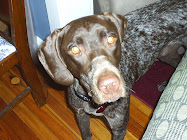Last night, the wife and I watched Jonestown: The Life and Death of Peoples Temple, a documentary shown as part of PBS's American Experience series. Jonestown is one of those pieces of recent history that I had never heard of until Jenna put it in our NetFlix queue. How this tragedy slipped through the cracks for me, I have no idea.
If you're like I was, and don't know anything about Jonestown or the Peoples Temple, go here. Briefly, Jim Jones founded The Peoples Temple in the 1950s, preached Apostolic Socialism, worked to integrate racially-divided communities, and ultimately, moved his flock to "Jonestown," Guyana, where his members lived in more or less a commune before their mass suicide on November 18, 1978. I believe this is where the term "drink the Kool-Aid" comes from.
On the whole, the documentary was very affecting but left me wanting more. The filmmakers built a narrative entirely out of survivor interviews, tape recordings, and old footage of Jones and his followers. There was no voiceover narration to fill in the gaps and tie the loosely-stringed series of events together. I think that would have helped. I couldn't tell if the documentary assumed a certain baseline understanding of Jonestown, which I didn't have, or if the filmmakers just left too much out of the story. Its runtime was less than 90 minutes. After seeing the film and reading more online, it could have easily been double that, or even a miniseries. More than once I said to myself, "wait a minute...why wasn't this mentioned before?" One moment, you're watching Jones preach, and the next moment, one of the survivors is relating an anecdote about how Jones "propositioned" him.
Later in the film, after Jones is about to be investigated in San Francisco, he suddenly moves his congregation to Jonestown. Interesting, yes. But prior to this, the film hadn't said much of anything about Guyana. Obviously, Jones had been planning this contingency--but why Guyana? And how did he purchase the land? And how did he get the Guyanese government to allow him to come there? And what were his plans? And how did he get these people to move there? Even more obscure is the motivations behind the suicide itself. Prior to the mass suicide, did Jones preach about how they should be prepared to do something like this? If you're feeling really morbid, you can listen to the "death tape". Fair warning, I only listened to about ten minutes before I had to turn it off.
Where the film lacks in details it more than compensates for in pathos. The survivor interviews personalize the tragedy to a degree that no voiceover work could ever achieve. The recordings, especially the images toward the end of the film, leave an indelible impression. What's most frightening to me is that in the archival footage, so many members of the Peoples Temple appear to be genuinely happy, even during their waning days in Guyana. On the whole, it's an intriguing piece of non-fiction, even though it left out a lot of the details. Watch at your own risk.
Some more facts, pulled from wikipedia:
-909 members of the Peoples Temple died on November 18, 1978
-Constituted the largest single loss of civilian life in a non-natural disaster until September 11, 2001
-During the airstrip shootings earlier that day, Congressman Leo Ryan was killed, becoming the first Congressman ever murdered in the line of duty
2 weeks ago






3 comments:
Hey, Brian. I was 24 years old when the news broke about the Jonestown mass suicides. I remember watching the newscasts in total shock and wondering how such a thing could have happened. It literally made my blood run cold and I was unable to put the event out of my mind for a long time afterward. I can understand why you'd not heard of the story, as it's hardly ever mentioned anymore, but in '78, it was huge.
Hey Rita,
I can only imagine what it must have been like to see/hear about it on the news. Really chilling stuff.
The mass suicide in '78 happened two months before I was born. It makes sense that I wouldn't have heard about it in grade school--not something a school should have as part of the curriculum for kids that age. Then I guess by the time I was old enough to learn about something like that, it was no longer news.
It's strange, but I think I know more about '40s, '50s, and '60s, than I do the '70s and early '80s, just because I was born in '79.
I was a very young teenager when this happened, but after all these years, I still remember watching the news reports. It was a real tragedy.
Post a Comment